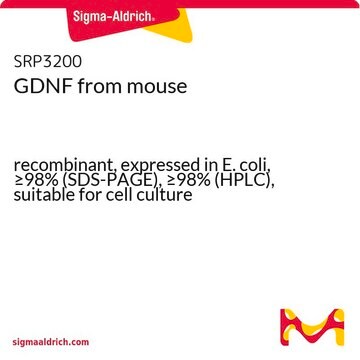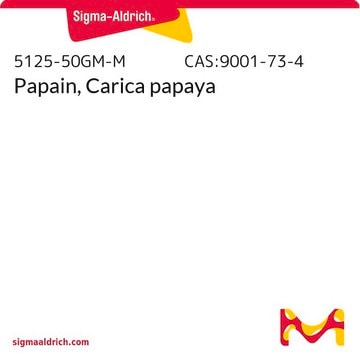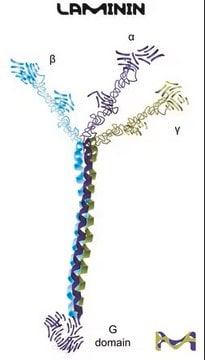G1401
Glial Cell Line-derived Neurotrophic Factor from rat
recombinant, expressed in baculovirus infected Sf21 cells, lyophilized powder, suitable for cell culture, ≥97% (SDS-PAGE)
Sinónimos:
ATF, Astrocyte-derived trophic factor, GDNF
Iniciar sesiónpara Ver la Fijación de precios por contrato y de la organización
About This Item
Productos recomendados
origen biológico
rat
Nivel de calidad
recombinante
expressed in baculovirus infected Sf21 cells
Ensayo
≥97% (SDS-PAGE)
Formulario
lyophilized powder
potencia
0.10-10 ng/mL
mol peso
~30 kDa
envase
pkg of 10 μg
condiciones de almacenamiento
avoid repeated freeze/thaw cycles
técnicas
cell culture | mammalian: suitable
impurezas
endotoxin, tested
Nº de acceso UniProt
temp. de almacenamiento
−20°C
Información sobre el gen
rat ... Gdnf(25453)
Acciones bioquímicas o fisiológicas
Glial cell-derived neurotrophic factor (GDNF) is a neurotrophic factor that is a member of the TGF-β superfamily. GDNF is founding member of the GDNF family of ligands, which to date include GDNF, neurturin (NTN), persephin (PSP) and artemin (ART). GDNF is a glycosylated disulfide-linked homodimeric protein of ~15 kDa. Mature rat and human GDNF share 93% sequence homology with strong species cross-reactivity. GDNF promotes survival of various neuronal cells in central and peripheral nervous systems and different stages of development including motoneurons, midbrain dopaminergic neurons, Purkinje cells, and sympathetic neurons. Cells known to express GDNF include Sertoli cells, type 1 astrocytes, Schwann cells, neurons, pinealocytes, and skeletal muscle cells. In addition, exogenously applied GDNF has been shown to rescue damaged facial motor neurons in vivo.
Forma física
Lyophilized from 50 μL of a 0.2 um filtered solution in PBS, pH 7.4 with 50 ug BSA per 1 ug as a carrier protein
Nota de análisis
The biological activity of GDNF is measured by its ability to bind to immobilized rrGFRa1/Fc in a functional ELISA.
Código de clase de almacenamiento
11 - Combustible Solids
Clase de riesgo para el agua (WGK)
WGK 3
Punto de inflamabilidad (°F)
Not applicable
Punto de inflamabilidad (°C)
Not applicable
Equipo de protección personal
Eyeshields, Gloves, type N95 (US)
Elija entre una de las versiones más recientes:
¿Ya tiene este producto?
Encuentre la documentación para los productos que ha comprado recientemente en la Biblioteca de documentos.
Los clientes también vieron
Roche C de Guzman et al.
Journal of microencapsulation, 25(7), 487-498 (2009-02-25)
Controlled expression of glial cell line derived neurotrophic factor (Gdnf) can be integrated in the development of a system for repair of injured peripheral nerves. This delivery strategy was demonstrated via inducible Gdnf from microencapsulated cells in barium alginate. The
Weidong Xiao et al.
Molecular neurobiology, 50(2), 274-289 (2014-06-01)
Acute intestinal ischemia reperfusion (IR) injury is often associated with intestinal epithelial barrier (IEB) dysfunction. Enteric glial cells (EGCs) play an essential role in maintaining the integrity of IEB functions. However, the precise mechanism of EGCs under IR stimulation remains
Clive Bate et al.
Molecular neurodegeneration, 3, 1-1 (2008-01-09)
The early stages of Alzheimer's disease (AD) are closely associated with the production of the Abeta1-42 peptide, loss of synapses and gradual cognitive decline. Since some epidemiological studies showed that EGb 761, an extract from the leaves of the Ginkgo
Michela Morano et al.
International journal of nanomedicine, 9, 5289-5306 (2014-12-09)
Innovative nerve conduits for peripheral nerve reconstruction are needed in order to specifically support peripheral nerve regeneration (PNR) whenever nerve autotransplantation is not an option. Specific support of PNR could be achieved by neurotrophic factor delivery within the nerve conduits
Caroline Perner et al.
STAR protocols, 2(1), 100333-100333 (2021-02-23)
In this protocol, we provide step-by-step instructions for dissection and culture of primary murine dorsal root ganglia (DRG), which provide an opportunity to study the functional properties of peripheral sensory neurons in vitro. Further, we describe the analysis of neuropeptide
Nuestro equipo de científicos tiene experiencia en todas las áreas de investigación: Ciencias de la vida, Ciencia de los materiales, Síntesis química, Cromatografía, Analítica y muchas otras.
Póngase en contacto con el Servicio técnico










